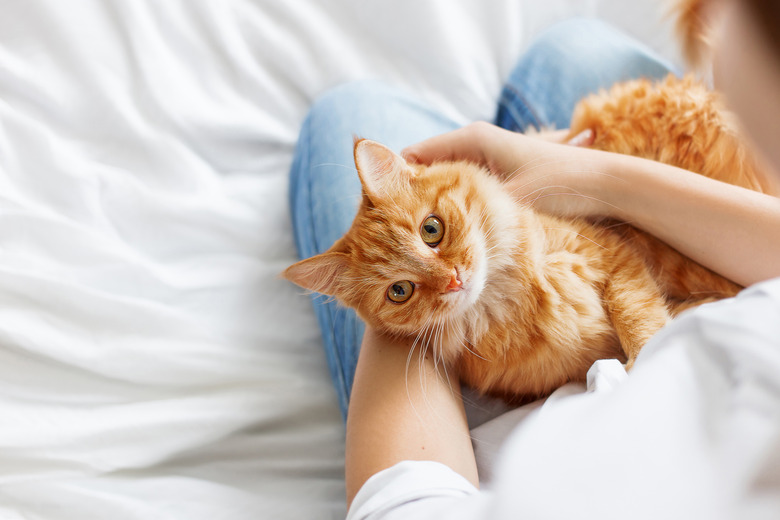Why Do Cats Like To Cuddle?
There's nothing better than a purring, cuddly cat sleeping in your lap or snuggling up next to you at night. While some cats adore cuddling and can always be found right by your side, others are more standoffish and don't enjoy snuggling up with their humans. The reasons behind cat and kitten cuddling behavior can explain a bit of why different cats have such different opinions about cuddling.
Cuddling is a learned behavior
Cuddling is a learned behavior
When you see adult cats cuddling, the cats are carrying out a behavior that they learned as kittens. Kittens cuddle with their mothers to establish warmth and security, and when adult cats perform this behavior, they're revisiting what they learned when they were kittens: Snuggle up next to someone who can protect you, and you'll be warm and safe while you sleep.
A kitten's socialization also affects how that kitten will feel about cuddling once she's an adult cat. Kittens need to be socialized when they're between two and seven weeks old since this experience can shape their comfort around people later on in life. Kittens who are handled and petted by humans regularly when they're young may be more likely to seek out humans for cuddling time when they're adults.
Different cat breeds and cuddling
Different cat breeds and cuddling
Some breeds of cats are more likely to enjoy cuddling than others. Persians, ragdolls, and other breeds that are known for being laid back and lower energy are more likely to enjoy spending some time cuddling with you. More active breeds, such as Bengals, are much less likely to be willing to slow down and spend time relaxing by your side.
While a cat's breed can provide some insight on how he may feel about cuddling, you'll still find exceptions, such as a ragdoll cat who doesn't like to cuddle at all. If you're trying to purchase or adopt a cat who will cuddle with you, it's best to visit with an older kitten or younger adult cat in person and see for yourself how he feels about cuddling.
Cuddling keeps cats healthy
Cuddling keeps cats healthy
While cuddling is enjoyable, it actually has the added benefit of keeping your cat healthy. A study of 96 shelter cats found that a group that received daily positive interaction, such as brushing and cuddling, was much less likely to develop an upper-respiratory infection by the end of the study. The group of cats that did not receive the daily cuddling and interaction displayed signs of being less content than the first group, and they were also sicker than the first group by the end of the study.
The exact reasoning behind why cuddling has these effects on a cat's health isn't yet known, but scientists believe that when cats are cuddled, they are content. That contentment may stimulate a cat's body to produce antibodies that help to keep the cat healthy.
Respecting your cat’s cuddle wishes
Respecting your cat's cuddle wishes
Cuddling may be beneficial to cats, but that doesn't mean that all cats enjoy being cuddled. If your cat really doesn't want to be cuddled, don't force the issue. Your cat's behavior may change as she ages and gets to know you better, but it's also possible that she'll just never be a cuddly cat.
If your cat does enjoy cuddling, be respectful of her boundaries. Most cats hate to be hugged, and your cat will be much more appreciative if you pat her, scratch under her chin, and watch her body language to learn just what she likes. By paying attention to what your cat is telling you, you can help to make cuddle time enjoyable for both of you.
Always check with your veterinarian before changing your pet's diet, medication, or physical activity routines. This information is not a substitute for a vet's opinion.
